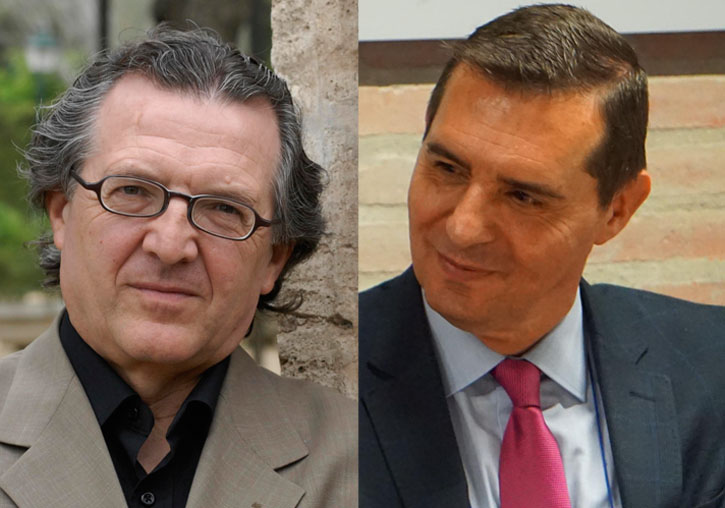
Professors Joan Romero and Jorge Olcina just published a book in which they analyse climate change, its socioeconomic impact and effects on the territory, as well as the social communication of these processes. The book compiles the diagnosis and alternatives presented by over twenty specialists within the framework of a seminar organised by the Prospect Valencian Community 2030 Chair. A space for academic reflection and strategic thinking at the service of public administrations, created by the Universitat de València with the patronage of the Presidency of Generalitat Valenciana.
The work is titled Cambio climático en el Mediterráneo Procesos, riesgos y políticas (Climate change in the Mediterranean. Procedures, risks and policies) and has been published by publisher Tirant lo Blanch, on their humanities collection. As explained by professors Romero and Olcina, the book wants to contribute scientific data for the knowledge of the process and ideas for the public administrations, the private sector and the citizenship to take practical action. To this Romero and Olcina set aside, additionally, one last chapter in which they produce a diagnosis about the deficit of territory governance as an obstacle for the design of public policies oriented towards the reduction and adaptation to climate change.
The contribution of the work group led by Fidel González Rouco “contextualises the problem at a global scale, as the variation of the Planet Energy Balance is essential to understand the current process of radioactive forces”, explain the editors at the prologue. Javier Martín Vide shows the truth of the current climate change in Spain, a transcript of the global thermal increase process, but with own particular nuances. The research group in climate models of the AEMET, led by Ernesto Rodríguez Camino, produces a projection of the main climate elements that becomes essential for the economic and territory planning. María José Estrelar and Javier Miró talk about the regional reality of climate change in the Valencian territory, where behaviours of great interest in temperatures, maximums and minimums, as well as in rainfall can be observed, there’s even some projections that can be surprising in some regions. María José López work shows the worrying speed at which the Mediterranean sea is heating up and its implications in the dynamics of the shoreline.
The second block of this monograph is dedicated to the social communication of the problem that, as highlighted by the editors, “it must be truthful, based on science and avoid at all costs extremist messages that could have the contrary effect”. In this are we find the works of Ángel Rivera and Mónica López (Meteorologist Communicators Association) and of Rubén del Campo (AEMET), which show the effective communication about climate change that produce the official meteorology organism of our country; as well as the works of María Josep Picó, who presents the result of research projects about climate change communication developed within the public university.
The third part of this book is dedicated to the territory and economic effects of climate change and the adaptation actions in the different sectors. Adolfo Calvo and María José Roxo make a detailed summary of the consequences of climate change in the soil erosion and degradation processes. Luis Balairón is in charge of the energetic issue, a key aspect of climate change, since one of the main solutions to this problem is betting for a production and provision energy model that isn’t based on burning fossil fuels. Leandro del Moral and Francesc La-Roca give an overview of the impact of atmospheric changes in the water resources of Spain, proposing actions for a rational adaptation of water planning. Carles Sanchis, Mar Ortega and Marta García dedicate their work to the presentation of already noticeable effects of climate change in agriculture throughout the Mediterranean shoreline, with proposal of actions to be developed. Fernando Vera and Samuel Biener focus their analysis in the reality of climate change in the tourism and the possible actions of adaptation for an essential economic activity of the Spanish Mediterranean shoreline.
One las block of the book is dedicated to highlighting some examples of good practices of adaptation to climate change in territory and urban planning. In this regard, Peio Lozano analyses the current reality present in the Basque Country, considered on the territories that is better working in policies of adaptation to climate change from the regional planning. Finally, Bas Amelung shows the experience of the city of Rotterdam, a specially vulnerable urban space in front of the effects of climate change within an European context and that has designed a strategic adaptation plan, which presents concrete milestones carried out in recent years.
Climate change, in the words of the coordinators of the work, “has stopped being a topic of “beliefs” and became one of “evidences”, a global atmospheric process with territory and socio-economic consequences at a regional and local scales. This is the reason why supporting reduction and adaptation actions will become the main axis of policies all around the world. A road in which no turning back is possible, an urgent challenge. A chance to do things right, respecting the environment”.
List of links:
Links:


